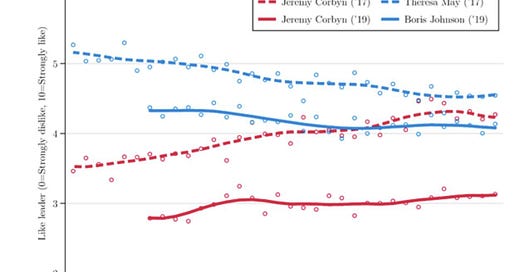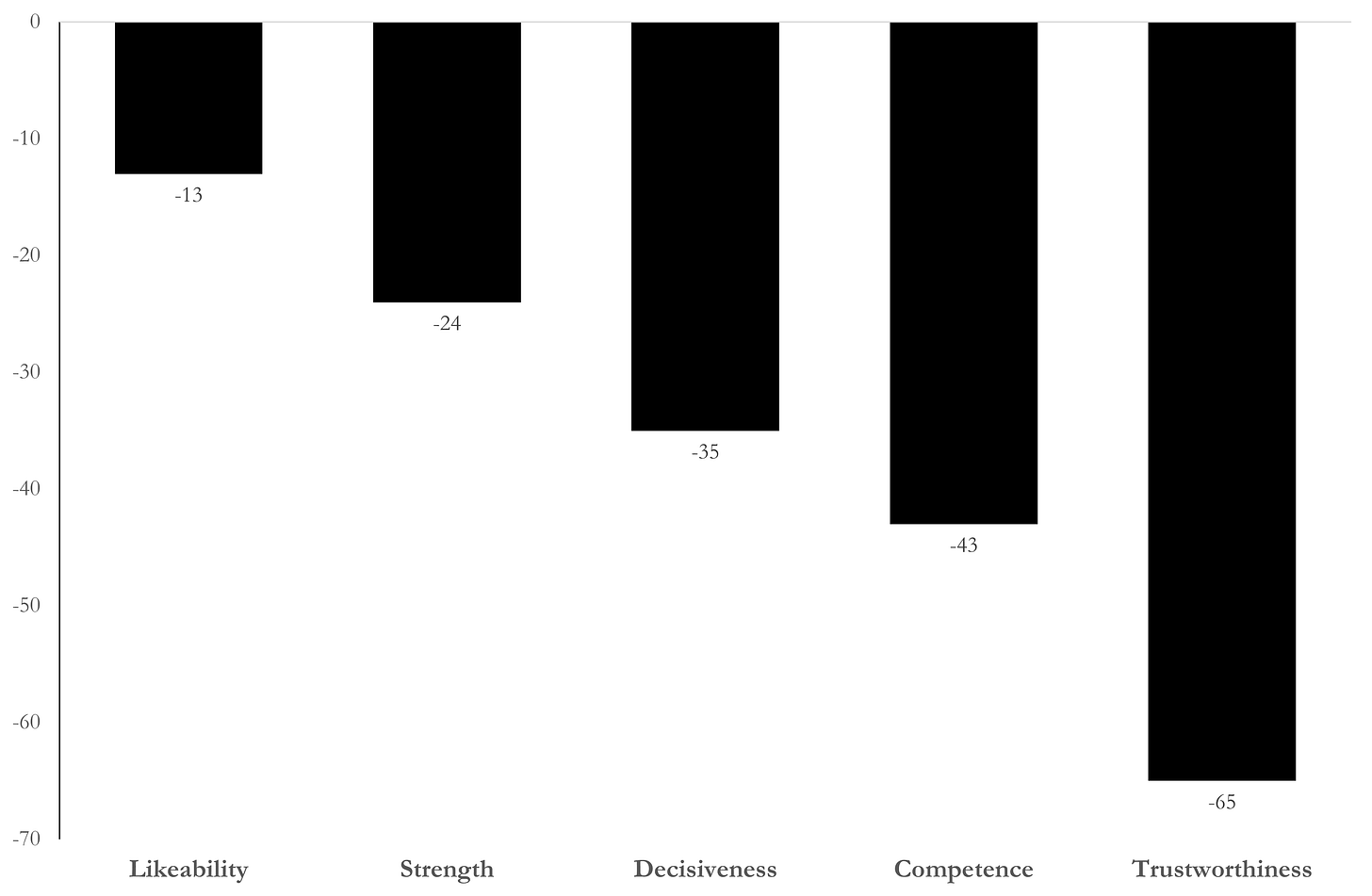With Boris Johnson’s shock resignation from Parliament returning him to the headlines, the Conservatives once again have a 'Life of Brian Problem'. A sizeable chunk of Conservative MPs and members believe Boris Johnson is the Messiah. Another sizeable chunk see Johnson not as the Messiah, but as a very naughty boy.1 This argument has broken out multiple times since ITV’s revelations of parties in Downing Street during lockdown began the long and ugly process of Johnson’s decline and fall. Here we go again.
While Conservative politicians struggle to weigh the merits and flaws of Johnson, the public do not. Johnson wasn’t a popular politician when he led the Conservatives to victory in 2019, he certainly wasn’t popular when forced from office last summer, and he isn’t popular now. There is no great yearning for his triumphant return. His impact on perceptions of his party has been entirely negative for close to two years. Electorally, he is an albatross around the neck of his successors.
Johnson’s unpopularity is not new. Though he won a large majority in December 2019, he was not personally popular before or during that campaign. Johnson is usually contrasted positively with Theresa May, the ‘Maybot’ of 2017. Yet Johnson was less popular at every point of the 2019 general election campaign than Theresa May had been at the equivalent point in the 2017 campaign (see figure 1). And it was May who did most of the work of attracting Leave voters to the Conservatives’ banner, in particular achieving large swings in the ‘red wall’ where in most cases she fell short. But in doing so she set up Johnson’s subsequent victory.
Figure 1: Popularity of Corbyn and May in the 2017 campaign (dashed lines) and Corbyn and Johnson
Source: Ford et al (2021) “The British General Election of 2019”
The Conservatives did not win in 2019 due to a surge in their support; they won bcause Labour collapsed, hobbled by a leader who had become toxic and a lack of credibility on Brexit. Johnson deserves credit for consolidating Leave support with a winning message - “Get Brexit Done” - but he also benefitted greatly by running against a tired and toxic opponent. The 2019 election was not a personal triumph for a popular Johnson. It was, like most elections, an outcome with many authors.2 Johnson’s talents as a campaigner and communicator no doubt delivered gainst at the margin, but he was a polarising figure from the outset. And Theresa May’s previous gains, Corbyn’s post-2017 decline, and the dominance of Brexit in voters’ minds all mattered just as much, if not more, in delivering the victory Johnson’s allies claim as his.
Johnson lost both of his strongest campaign props within months of victory. Once Brexit was done, and Corbyn was gone, it was only a matter of time before the Prime Minister’s dubious relationship with the truth and tendency to generate chaos would become the focus of critical attention. The COVID pandemic put off this day of reckoning, with voters rallying behind the PM during the initial crisis and lockdown, and strong approval of Britain’s rapid vaccine rollout providing a substantial bounce to Johnson’s ratings in the first half of 2022. But while Johnson’s deeds in public during the pandemic boosted his standing with the public, his deeds in private, once revealed, hastened his downfall.
Figure 2: Boris Johnson’s satisfaction ratings with IPSOS-MORI during his three years as Prime Minister
Source: IPSOS-MORI Political Monitor
When the fall came, it came hard and fast. Johnson’s satisfaction ratings, which were already sliding when the first ‘partygate’ stories started to break in autumn 2021, collapsed thereafter. As the above data from IPSOS-MORI illustrates, more than half of the public were unhappy with his performance as leader for all of the last nine months of his premiership. His all time low rating of -46 was the 6th worst figure ever recorded by IPSOS-MORI for any government or opposition leader since they started asking this question in the mid-1970s. When Johnson was finally removed after months of scandal and chaos, Johnson was as unpopular as Thatcher in the wake of the poll tax, May after her Brexit deal collapsed (see figure 3 below). Only Liz Truss has departed Downing Street on worse terms with voters, and that was after she crashed the economy in a month.
Figure 3: Final Prime Minister approval ratings 1979-2022
Source: IPSOS-MORI political monitor
Polling data shows the breadth of public rejection. Focus groups give us a sense of the intensity of feeling. Voters were extremely fed up with Johnson by the time he was forced out - and very clear on why they were unhappy. The terms used to describe Johnson by participants in focus groups organised by James Johnson and Times Radio in Johnson’s final months include “lying buffoon”, “selfish and greedy” and “just an idiot”.3 Here’s a word cloud of all the terms used to describe Johnson by participants in April 2022 polling by JL Partners:
Figure 4: Descriptions of Boris Johnson in April 2022
Source: JL Partners poll 13th-14th April 2022
The Conservatives’ electoral performances in Johnson’s final year were also dire. There were five contested by-elections after the "partygate" scandals first broke, and the average Conservative vote change across all five was -17.3%, including two safe seats (North Shropshire and Tiverton and Honiton) lost to the Liberal Democrats, and a ‘red wall’ marginal (Wakefield) lost to Labour. The 2022 local elections were a bloodbath for the Conservatives, who lost a quarter of the seats they were defending, with Labour taking control of Westminster and Wandsworth councils for the first time in fifty years.
Absence makes the heart grow fonder?
Johnson was toxic when he was forced out, and he has remained toxic since. You can't unburn toast. For example, YouGov continued to poll voters on Johnson’s personal qualities through the summer of 2022. His final recorded ratings in August 2022 were as follows:
Final YouGov ratings on Boris Johnson’s personal qualities
Source: YouGov trackers August 2022 figures
More recent polling shows no evidence of any softening in public views. 72% of voters asked by YouGov in March rated Boris Johnson as dishonest; 55% of those asked in February said they would be unhappy if Johnson returned as PM; and 65% of those asked this week said Johnson had knowingly misled Parliament.
Johnson isn't popular and never was. His Premiership collapsed in a morass of scandal and chaos. His own misdeeds were many and serious, and voters wanted him out. Voters were enraged by dishonesty, incompetence and rule breaking. They are angry still. Johnson’s downfall is what voters wanted. While some Conservative MPs may still yearn for the king over the water, the British public made up their minds long ago: Boris Johnson is not the Messiah. He is a very naughty boy.
The credit for the “Life of Brian” theory goes to Joe Twyman of DeltaPoll, who first framed this theory of the Conservatives’ Johnson problem last autumn. For example:
You can read more about the various factors influencing the 2019 election result in “The British General Election of 2019”, available here: https://www.amazon.co.uk/British-General-Election-2019/dp/3030742563
You can watch some of the video from these Times Radio/JL Partners focus groups here - voters don’t hold back:









I was struck by the polling that showed Major, Blair and Brown all left office considerably more popular with the public than Cameron, May, Johnson and Truss. To what extent do you think Johnson’s unpopularity is irrelevant, as the Conservatives seem to have been able to do enough in 2015, 2017 and 2019 to retain power despite unpopular or divisive leaders?
Ie there would still possibly be enough people to vote Tory despite Johnson, while he would attract certain voters into the Conservative camp to enough of an extent to get them over the line.